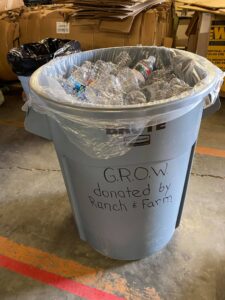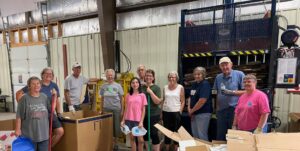GROW is a constantly-evolving group of volunteers. The idea of GROW started a couple of years ago, when a group of Dawson Resource Council members were inspired to try to restart a recycling center in Glendive.
After a few community meetings and lots of planning, DRC started to collect cardboard at the EPEC parking lot once a month. The turnout was incredible and the citizens’ response was very positive! This inspired DRC to start thinking outside the box. DRC started a fundraising campaign, which brought in many donations from local businesses and community members.
The group of volunteers decided it was time to establish themselves as a non-profit and get serious about recycling. They elected officers, and they wrote bylaws. GROW then started looking for a building that the group could afford. In February of 2021, the Uran Center (KMart) offered us a lease, which finally gave a home to our big blue cardboard baler.

GROW became comfortable with the process of recycling cardboard and decided that they should look into what recycling plastic required. Volunteers went to various towns in the area that were recycling plastic to see their processes.
GROW established a business to deliver their recycled plastic.
The volunteers next focused on a plastic recyling baler and the trailer to haul it. A volunteer wrote a letter to the Masons, and they generously covered the cost of the baler. KOCH Furniture, a cardboard recycler, provided GROW with the money to purchase the trailer.
Volunteers saw a need to provide businesses with cardboard collection and transportation to the recycling facility. GROW members also built containers out of pallets for businesses to place their cardboard. Eventually, volunteers established collection routes and schedules for local businesses.
GROW, in its bylaws, states that the group will educate about the importance of recycling. Plastic recycling provided an opportunity to do this. In a couple of busy months, volunteers educated Glendive about how to identify number 1 and number 2 plastic and how to prepare their plastic for recycling. Volunteers set up tables outside the grocery stores and displayed samples of plastic containers that could or could not be recycled by our group. They also exhibited items made from recycled plastics. Volunteers attended local community meetings and talked about our recycling and were guests on our local TV channel.
Communicating the hours of operation was the next challenge. Volunteers used marquees, newspaper articles, and memo cards to advertise the operating hours. Community feedback during this process encouraged GROW to add after 5pm hours. Now, new volunteers stop in for a couple hours on their way home from work.
